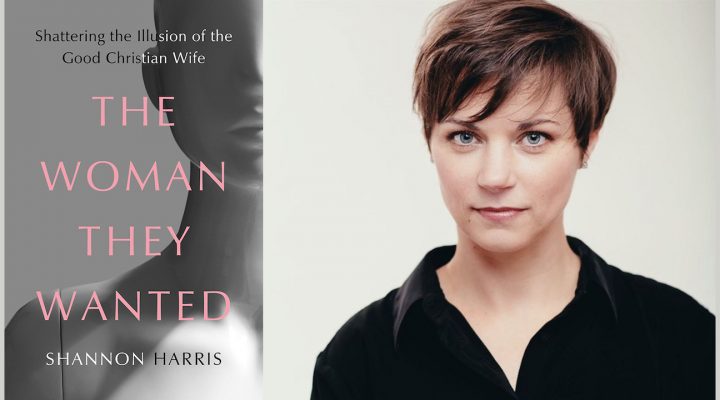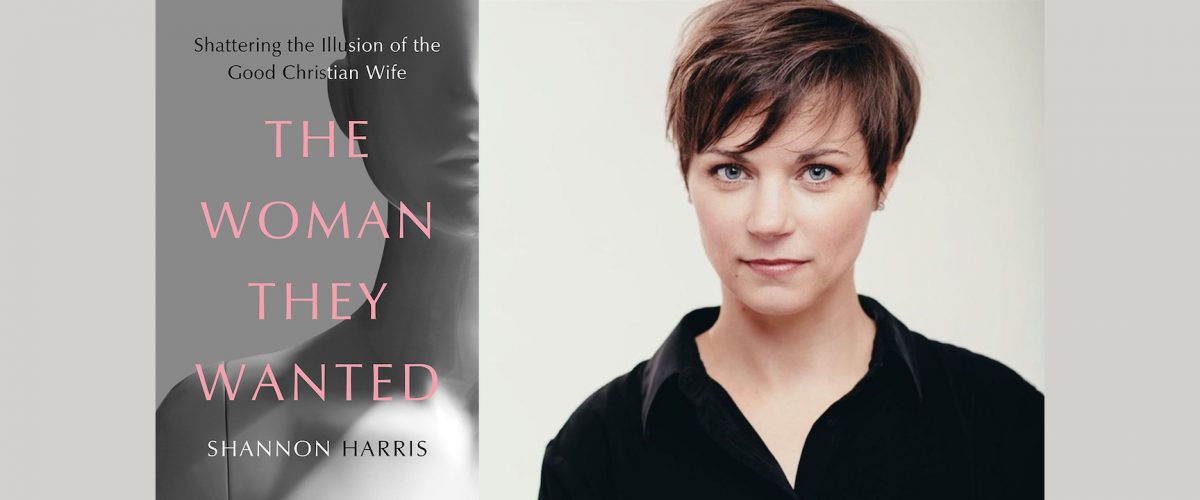We first met her nearly two decades ago as a neatly wrapped character named Shannon Hendrickson in a bestselling “Boy Meets Girl” book written by her ex-husband about his theology of courtship after kissing dating goodbye.
The character we were told about had led “an empty life lived for herself — a life ruled by sin” in pursuit of “the ladder of stardom.” We were told she was “careless, even reckless,” filled with “pride and independence,” and that despite putting on an “act” of “confident rejection,” eventually repented of her “sinful and self-centered life.”
Years later, we listened as she sang, “Alas and did my Savior bleed, and did my Sovereign die? Would he devote that sacred head for such a worm as I?”
In the “Thanks” section of his book, Shannon Harris’s ex-husband Josh wrote: “To C.J. Mahaney. Your vision and confidence in the importance of this book have sustained me many times during the past year. Your influence has touched every part of it.”
Then to Shannon, Josh wrote: “Darling, only God knows the ways you sacrificed for this book. Thank you for your humility and your willingness to be a trophy of God’s grace.”
So according to Josh’s own words at the time, Josh’s bestselling book Boy Meets Girl was a C.J. Mahaney controlled depiction of Shannon Harris being a trophy.
Eighteen years later, we might wonder what Shannon’s perspective was.
‘What is she thinking about?’
Boy Meets Girl opens with Josh relaying a scene where Shannon exits the church at the end of a workday, sits in her navy blue Honda Accord, and begins crying.
Josh writes: “What is she thinking about? I wondered,” as he looked down at her from behind his upper church window.
Wonder no more. Last month, Shannon Harris let us know what she was thinking about by releasing a book of her own — The Woman They Wanted: Shattering the Illusion of the Good Christian Wife.
Shannon recounts how her experience in the conservative evangelical charismatic Calvinist group Sovereign Grace Ministries that was led by C.J. Mahaney whittled her down to their theological gender role trophy, and how she began to heal her way toward being herself again.
“The ‘biblical woman’ was not a real woman, she was a picture, a projection, a product!”
“As I began to find my own identity again, I remembered. Being myself isn’t nearly as exhausting as being somebody I am not,” Shannon writes. “The ‘biblical woman’ was not a real woman, she was a picture, a projection, a product! A man-made product, literally. An ideal to achieve. You can order whole books on Amazon and become her too. But she wasn’t me and she wasn’t tons of women. She was the woman they wanted. That’s all. The woman they wanted. It was like wearing an outfit, though women might all wear her a little differently. Some women slung her over their shoulder, wearing just enough to pass approval. Some threw her down and left. Some women, like me, got completely lost in her. I could wear this woman, but that didn’t mean I was this woman. These men had no clue who I really was on the inside.”
Who is Shannon Harris on the inside?
In the month since her book’s release, conservative evangelicals have responded to Shannon’s inner healing in a variety of ways. Some have lamented the way she was treated by the church and have called on people to hurt with her. But most have either ignored Shannon’s book or have complained she has “rejected Christ” and therefore must have “never truly been born again.” To them, what’s sad about Shannon’s story isn’t that they made her feel like a worm, but that she needs to feel like a worm again.
But the inner wild of Shannon Harris is not their story to control or ignore. It’s her story to reveal however little or much she desires to share.
In an interview with Baptist News Global, Shannon discusses how the reaction to her book has gone, as well as how she’s continuing to heal.
In your book, you say: “Will they listen to my story? It is unlikely.” Then you share a number of responses you’re expecting to hear. Now that the book has been released, have they listened to your story? Are there any unexpected ways that you feel heard?
Well, those in fundamentalist or conservative groups who don’t want to see their beliefs or doctrines challenged are dismissing it as I thought they would. They aren’t ready to hear my message, and that is unfortunate because it means they aren’t willing to stop and understand the impact of their work.
The good news is I’m hearing from people coming from different walks of life and ages and beliefs who have read the book and the response has been overwhelmingly positive. Making mistakes, lacking courage, stuffing a dream, losing oneself in someone or something … at the end of the day these are universal themes. It’s been encouraging to see that many people have found something in the book that resonated with them. It has made me feel less alone for sure and also more known in a good way.

Margot Robbie as Barbie
You say, “There is more to life than obedience and plastic appearances.” When I first read this, I had just watched the new Barbie movie. Given that Barbie explores what it means to be human in a world of patriarchy, I’m curious how that movie may have resonated with you.
I thought the movie was brilliant. It shows how patriarchy has hurt women, of course, but also how it’s hurt men and everyone in between. I brought my mom to see it with me. So it was really a full circle kind of moment.
My mom didn’t like the messaging behind Barbie dolls, so growing up I didn’t have a single Barbie. She had me watch Stepford Wives when I was 10 years old. It’s crazy to think I had this mother who wanted to empower me and still I turned around and let myself be constrained and put in a tiny box. It makes me think we have not progressed as far as we’d like to believe. It’s modern day, and still I got buried six feet under in Ken’s Church World.
That to me is where Ruth Handler is in the movie. I saw her as buried under the company and by men. And let me tell you it wasn’t easy to dig myself out. I absolutely love that the movie offers a fresh vocabulary and frame of reference to talk about these things.
It’s ironic that a religious group claims to be so confident in having the imputed perfection of Jesus but then constantly confronts one another and avoids being identified with any appearance of failure. Do you think the fruit of constantly confronting one another grows from an insecurity that’s subconsciously rooted in the theology of a God who demands either absolute perfection or imputed perfection in order to be in relationship with us?
I think that is possible, but I’m more inclined to think it stemmed from a hidden agenda involving Sovereign Grace Ministries (formerly called People of Destiny and now called Sovereign Grace Churches) the ministry I was a part of.
Near the end of my time there, allegations that the ministry covered up sexual abuse in the 1980s were brought forth by victims. The case hasn’t gone to trial due to the statute of limitations. But it makes sense to me now that if they had something to hide, they’d not want to get in a place where they weren’t in control.
So exerting excessive control and focus on others may have been a way to avoid that. Sadly, the ministry has refused repeated calls to open up for an investigation on behalf of the victims.
You mention: “As life at church was unbalanced, so was the healing. But I feel I am at equilibrium again.” Much of the conservative evangelical response to deconstruction has been to meet it with intellectual arguments. But for many of us who go through it, deconstruction is a healing journey of opening up toward self and neighbor. How have you maintained healing as your focus, rather than merely debating issues? And for those of us who are feeling overwhelmed in the unbalance of the healing, how can we breathe and move toward equilibrium?
Having a public life taught me very quickly arguing was a waste of time and precious energy. Many people felt the freedom to share their thoughts about my life and at first I did get sucked in. But sadly, I had to put a thick turtle shell around me while continuing to heal.
“I had to put a thick turtle shell around me while continuing to heal.”
It taught me the importance of being fierce when you know what you want and need. I learned to delete a lot, to communicate boundaries, to say “nope” and “no.” Not everyone is going to understand you. That’s OK.
To those healing I’d say trust the process and yourself. Trust what your body is telling you. Spend time with supportive people. Learn to identify what you want, need and value and how to obtain those things. Lots of self-care in all the ways and treat yourself the way you’d treat someone you love very much.
You share the story of your music professor complimenting you for showing restraint in your composition. Then you observe, “Maybe sharing a beautiful religion isn’t only about knowing what to include but knowing what to leave out.” In writing your book, there was so much that you could have said that you left out. Something about that felt profoundly human to me. It’s also what draws many of us to hear the wisdom of women who run with the wolves. Perhaps my question here isn’t so much a request for an answer as it is an affirmation of your humanity, a recognition of your gift of composition, and an open presence with you in knowing that you don’t have to be who any of us want you to be either.
That’s an insightful comment. Yes, I’m very human. I didn’t say everything I could have. An important lesson I learned growing up from my father was to always leave a place better than you found it. That’s what I was trying to accomplish with this book. I wanted to leave the church a better place than how I found it.
I’m really quite a private person. Yet I felt my story was important to share because my life was used in a very public way. I was used as a mannequin of sorts for people, and mannequins aren’t real. I thought maybe I could help undo some of the damage. But I felt that tension while I was writing.
Second, as a writer, in addition to the storytelling I was trying to bring readers into my experience of the church. Look at it from that angle and what I wrote was the entirety of my life. I spent 15 years going between my house and the church and there really wasn’t much else. If after reading you leave feeling kind of empty and unsatisfied? Well, I think you would be right to feel that, because that is exactly how it felt to me.

Rick Pidcock
Rick Pidcock is a 2004 graduate of Bob Jones University, with a Bachelor of Arts degree in Bible. He’s a freelance writer based in South Carolina and a former Clemons Fellow with BNG. He recently completed a Master of Arts degree in worship from Northern Seminary. He is a stay-at-home father of five children and produces music under the artist name Provoke Wonder. Follow his blog at www.rickpidcock.com.
Related article:
How viewing sex as an icon leads to the pornification of Christian women and the church as Christ’s bride | Analysis by Mallory Challis


